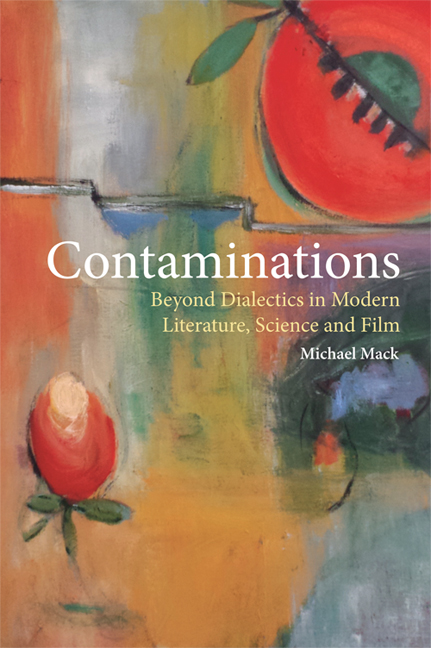Book contents
- Frontmatter
- Contents
- Acknowledgements
- Dedication
- Introduction: Climate Change and the Contamination of the Anthropocene
- 1 Contaminating Psychology with Biology: Descartes, Spinoza, Freud and Žižek
- 2 Contaminating the Visible with the Invisible: From Einstein via H. G. Wells to Hannah Arendt, Luhmann and Derrida
- 3 Contamination of Nature with Society: The Collapse of Natural Order from Melville to Wells and Ellison
- 4 Contaminating Judgement with its Suspension: Guilt and Punishment in Walter Benjamin, Herman Melville and Henry James
- 5 Contaminating the Digital: Action and Perception in Henry James and Alfred Hitchcock
- 6 Contaminating the Sacred with the Profane: Pier Paolo Pasolini and Biopolitics
- 7 Contaminating Posthumanism
- Bibliography
- Index
Introduction: Climate Change and the Contamination of the Anthropocene
Published online by Cambridge University Press: 05 August 2016
- Frontmatter
- Contents
- Acknowledgements
- Dedication
- Introduction: Climate Change and the Contamination of the Anthropocene
- 1 Contaminating Psychology with Biology: Descartes, Spinoza, Freud and Žižek
- 2 Contaminating the Visible with the Invisible: From Einstein via H. G. Wells to Hannah Arendt, Luhmann and Derrida
- 3 Contamination of Nature with Society: The Collapse of Natural Order from Melville to Wells and Ellison
- 4 Contaminating Judgement with its Suspension: Guilt and Punishment in Walter Benjamin, Herman Melville and Henry James
- 5 Contaminating the Digital: Action and Perception in Henry James and Alfred Hitchcock
- 6 Contaminating the Sacred with the Profane: Pier Paolo Pasolini and Biopolitics
- 7 Contaminating Posthumanism
- Bibliography
- Index
Summary
‘The disorder of nature is apparent’
Nancy CartwrightThis work is a study in theory, intellectual history, science, cinema and literature, comprising American and English literature from the mid-nineteenth century to the present. It is an original work of research which could at the same time be read as an advanced critical analysis of the theory of contamination. This monograph introduces the figure of contamination as an alternative to dialectics: whereas dialectics separates two entities and traverses from one to the other (finally negating negation), contamination allows for the simultaneous interdependence of what has previously been conceived of as separate or opposed. Whereas dialectics unfolds through the positing of oppositions, contamination operates on the biological model of symbiosis (‘the world of life not only consists of independent species, but every individual of most species is actually a consortium of several species’ (Mayr 2002: xiv)).
The motif of contamination is implicit in postmodern literature and theory. In this sense the book offers an exploration into the theory of contamination, a theory which has not been explicitly addressed in a monograph before. By contributing towards a novel view of the figure of contamination, this study also constitutes an original work of research. Derrida's notion of the trace implies some form of contamination, but it is a neutral term (it could be a trace of something positive or negative). The figure of contamination as developed in this book, however, offers a new perspective on negativity which questions the current influence of Hegelian dialectics in contemporary theory and philosophy (from Robert Pippin to Slavoj Žižek, and Catherine Malabou).
Dialectics has been implicitly questioned in Hannah Arendt's critique of modern science. This is why Chapter 2 focuses on Arendt's critique of a scientific loss of the word. As we will see there, her contaminating approach to the secularisation controversy anticipates that of Derrida's deconstruction. Like the Frankfurt School, she is addressing both Descartes's cogito and its later revisions in German idealist notions of autonomy (Kant) and dialectics (Hegel). In this way the book also offers an advanced critical introduction to the critique of dialectics, to which it at the same time contributes as an original piece of research. How does it combine the accessible element of an advanced critical introduction with that of an original piece of research?
- Type
- Chapter
- Information
- ContaminationsBeyond Dialectics in Modern Literature, Science and Film, pp. 1 - 22Publisher: Edinburgh University PressPrint publication year: 2016



